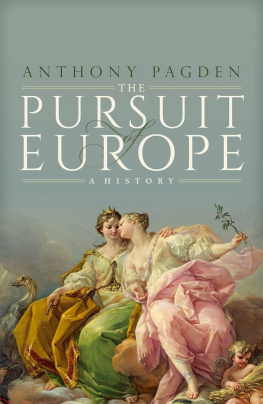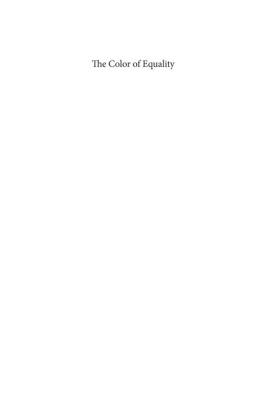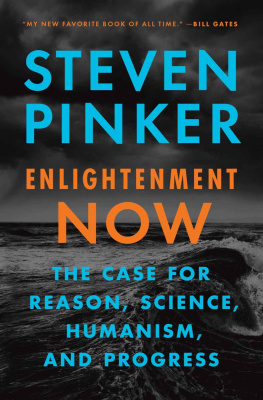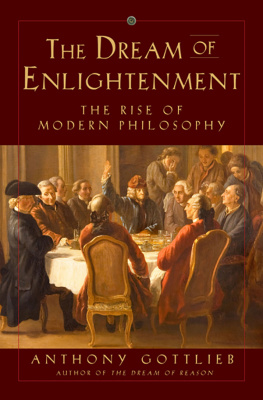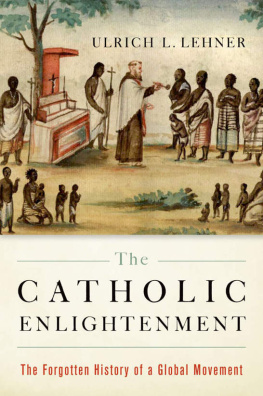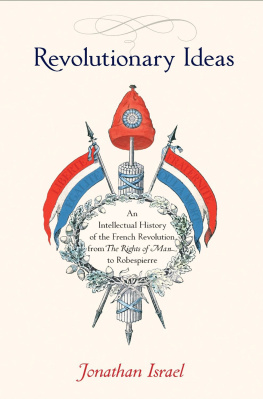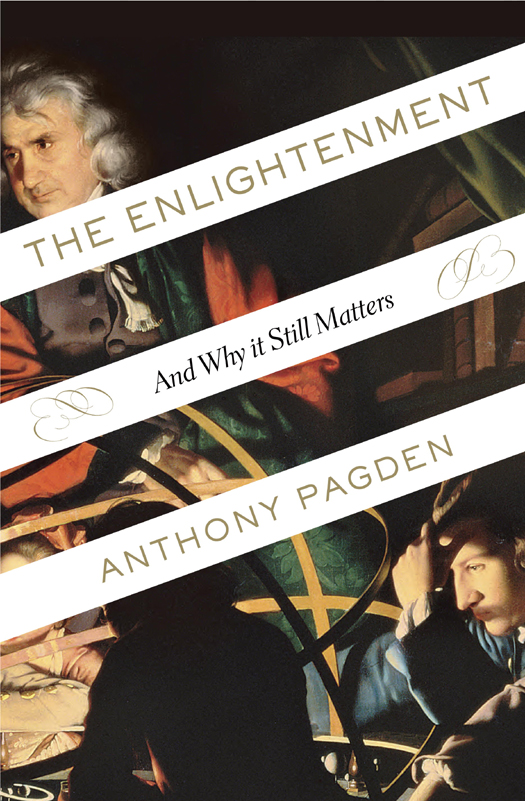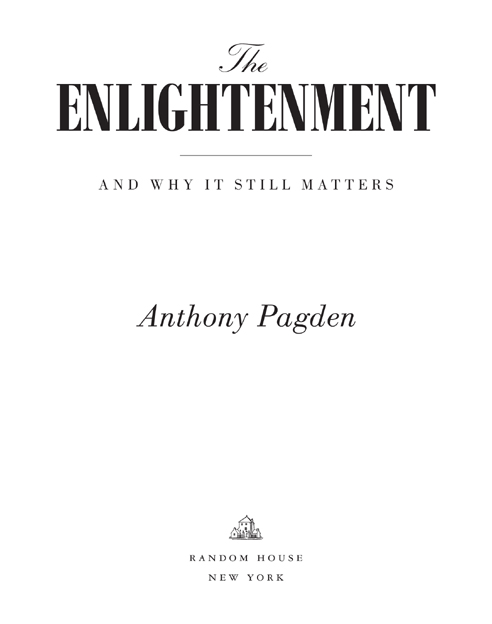Copyright 2013 by Anthony Pagden
All rights reserved.
Published in the United States by Random House, an imprint of The Random House Publishing Group, a division of Random House, Inc., New York.
Random House and colophon are registered trademarks of Random House, Inc.
Library of Congress Cataloging-in-Publication Data Pagden, Anthony.
The Enlightenment : and why it still matters / Anthony Pagden. pages cm
Includes bibliographical references (pages ).
eISBN: 978-0-679-64531-3
Enlightenment. I. Title.
B802.P26 2013
940.25dc23 2012043848
www.atrandom.com
Jacket design: Thomas Beck Stvan
Jacket painting: Joseph Wright (a.k.a. Joseph Wright of Derby), A Philosopher Lecturing on the Orrery, c. 1766 (Derby Museum and Art Gallery/Bridgeman Art Library)
v3.1
PREFACE

There are many ideological divisions within the modern world. One of the most persistent, most troubling, and increasingly most divisive, however, is the struggle over the legacy of the Enlightenment. The Enlightenmentthat period of European history between, roughly, the last decade of the seventeenth century and the first of the nineteenthhas had a far greater and more lasting impact on the formation of the modern world than any of the intellectual convulsions that preceded it. The Renaissance and the Reformation, although they too transformed the cultures of Europe, and subsequently the whole of Christianity, in irreversible ways, are for most people today simply periods in history. Not so the Enlightenment. If we regard ourselves as modern, if we are forward-thinking, if we are tolerant and generally open-minded, if stem-cell research does not frighten us but fundamentalist religious beliefs do, then we tend to think of ourselves as enlightened. And in thinking this, we are in effect declaring ourselves to be the heirs, however distant, of a particular intellectual and cultural movement.
There has been much heated debate over just what the Enlightenment was, when and where it occurred, and whether it was one or many. Attempts have been made to divide it up into radical and conservative groups or to distinguish between different national varieties in which the level-headed and reasonable English or the solemn and philosophically serious Germans are generally set against the extreme, over-hasty, and unduly literary French. Some of these distinctions have their origins in the eighteenth century itself. Some are simple speculative fantasy. But for all the clear differences that did exist within it, the Enlightenment has been identified with an exalted view of human rationality and of human benevolence, and with a belief, measured and at times skeptical, in progress and in the general human capacity for self-improvement. It has been broadly understood to stand for the claim that all individuals have the right to shape their own ends for themselves rather than let others do it for them andwhat comes to much the same thingto live their lives as best they can without help or hindrance from divine decrees. It has been seen as the source of most modern liberal, tolerant, undogmatic, and secular understandings of politics and as the intellectual origins of all modern forms of universalism, from a recognition of the essential unity of the human race and the evils of slavery and racism right through to the humanistic sentiments behind Mdecins sans frontires. It is widely regarded as having been the intellectual origin of our still slowly emerging conviction that all human beings share the same basic rights and that women think and feel no differently from men or Africans from Asians. As an intellectual movement it also saw the beginning of those disciplineseconomics, sociology, anthropology, political science, and certain kinds of moral philosophythat dictate much of how we view, and attempt to control, our lives today. Modernity was the creature of a great many intellectual and scientific configurations, from the invention of the steam engine to the Internet, very little of which can be attributed to the Enlightenment (even if it was the eighteenth-century German philosopher Gottfried Wilhelm Leibniz who first devised the binary system on which the modern digital computer is based). What can be attributed to it, however, is the broadly secular, experimental, individualistic, and progressive intellectual world that ultimately made those innovations possiblea world in which the old and apparently unassailable forms of association, of belief and tradition, that had for centuries divided human beings into mutually suspicious and often brutally homicidal groups were slowly and painfully, but irreversibly, abandoned. This is not to say that without the Enlightenment modernityhowever understoodwould never have taken place, that without it we would all still be burning unbelievers or listening to hellfire sermons for our weekly entertainment. But it most certainly would not have taken place how and where it did.
It is to the Enlightenment that we also owe the modern conception of the global society. The world is, of course, still firmly divided into nation-states, many still struggling furiously with one another; to any mildly skeptical observer, the prospect of what the United Nations once optimistically referred to as Our Global Community must still seem a long way off. But the fact that most liberal-minded and educated persons now accept that peoples should be willing and able to cooperate across frontiers must be cause for hope.
Such globalism or cosmopolitanism is also an Enlightenment conception, and it is one of my main objectives in this book to describe how it became possible for an admittedly small number of European intellectuals to refer to themselves as ultimately not English, French, Dutch, Saxon, Spanish, or Neapolitan but citizens of the world. Cosmopolitanism is an ancient creed, but before the eighteenth century it had been largely the refuge of a few dissenting and rootless outsiders, like Diogenes the Cynic, who first coined the term in the fifth century BCE ; or it had been closely associated with empire (one of the greatest of the ancient cosmopolitans, Marcus Aurelius, was also one of the greatest of the Roman emperors); or else it had been a cloak for religious uniformity (in both Christianity and Islam there are no nations, only one people under God).
During the Enlightenment, however, the claim to be a citizen of the world acquired quite different meanings. It came to stand for a form of ecumenism open to all those who were prepared to live by certain minimal legal and moral codes. It became a way of combating the narrow tribalism that seemed to many to be the ultimate cause of so many of the ills of the world. It became a way of understanding human and international relations that might finally lead what the English utilitarian Jeremy Bentham called the cabinet of mankind to conclude that universal and perpetual peace that had eluded the species Homo sapiens sapiens since its creation. Today we may not have gone very far toward realizing these ambitions, but if there does exist some conception of universal justice, if even the most powerful states on occasion feel compelled to abide by the demands of international law, that we owe to the Enlightenment.
Not everyone sees it this way, however. Today many have grown suspicious of precisely those values and aspirations that are now closely identified with the Westitself an eighteenth-century coinageof which the Enlightenment is seen as the most heinous representative. The past century and a half of Euro-American history has come to be regardedand not without reasonas little more than a litany of war and oppression, colonization and exploitation. In the light of such a history, the airy, optimistic, ecumenical claims of the Enlightenmentor what is widely taken to be the Enlightenmenthave come to look threadbare, if not hypocritical and presumptuous. It is the Enlightenment that is now accused of being responsible for a Eurocentrism that led inexorably to an implacable intolerance of everyone, and everything, that rose to challenge its rationalistic, reductive objectives, thus making it the midwife to modern imperialism and modern racism.


